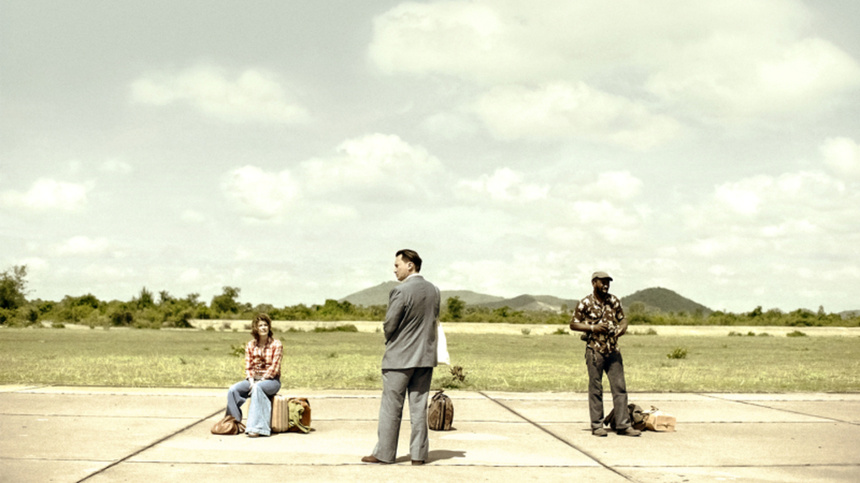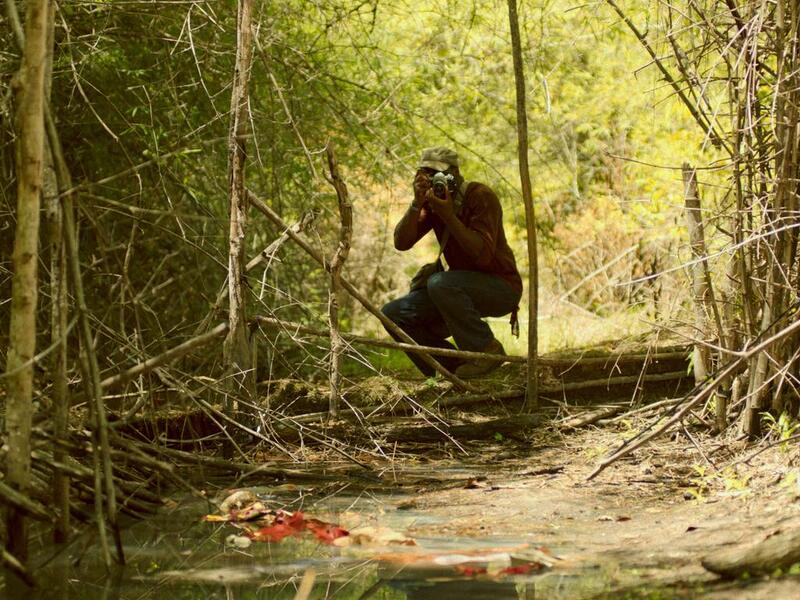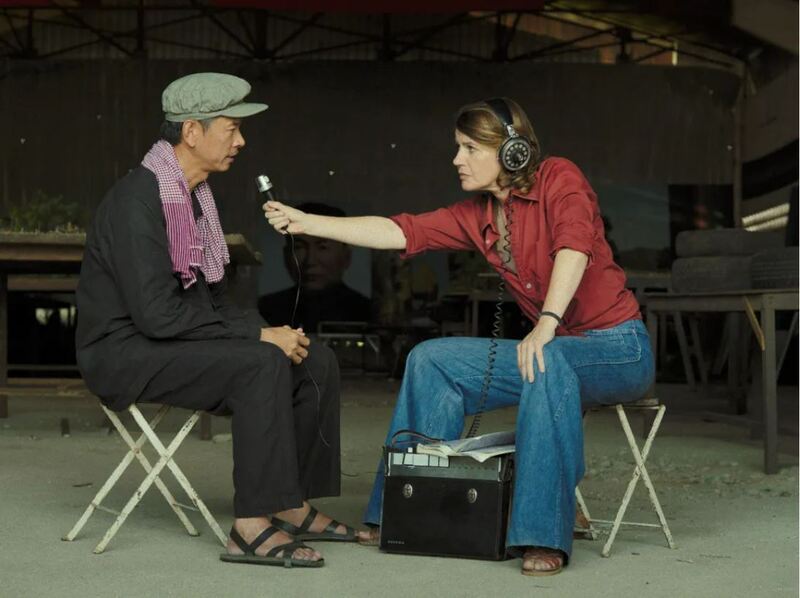Mediterrane 2024 Review: MEETING WITH POL POT Unmasks Khmer Rouge Genocidal Utopia
Cambodian filmmaker Rithy Panh offers a haunting exploration of the Khmer Rouge regime through the eyes of three French journalists and the utopia gone wrong.

Cambodian filmmaker Rithy Panh revisits one of history's most brutal regimes in his latest drama, Meeting with Pol Pot.
Set in 1978 Democratic Kampuchea, the film follows three French journalists — Lisa Delbo (Irène Jacob), Alain Cariou (Grégoire Colin), and Paul Thomas (Cyril Guei) — as they navigate the deceptive facade of the Khmer Rouge's purported utopia, only to uncover the nightmarish reality lurking beneath. Drawing on Elizabeth Becker's memoir, When the War Was Over, Panh delivers a stark drama that juxtaposes the journalists' dedication to uncovering the truth with the regime's manipulative totalitarianism.
Rithy Panh has previously explored the atrocities of the Khmer Rouge and other genocides in his works, including his 2020 documentary Irradiated. While Meeting with Pol Pot is primarily a drama, Panh’s distinctive approach blends fictional storytelling with documentary elements.
This technique, seen in films such as The Missing Picture and Bophana: A Cambodian Tragedy, utilises a combination of archival footage, interviews, and clay figurines to convey the harrowing reality of genocide. Panh employs a similarly eclectic style, incorporating real color shots, black-and-white archives, and overprints in Meeting with Pol Pot.
The three French journalists offer distinct perspectives on the unfolding atrocities. Irène Jacob’s Lise Delbo, inspired by Becker herself, epitomises the relentless pursuit of truth amidst pervasive censorship. She persistently questions her interviewees, seeking to expose the cracks in the communist utopia they present. Grégoire Colin’s Alain Cariou, a Marxist academic, represents the ideological blindness that can obscure moral clarity.
He patiently awaits the titular meeting with the leader he believes he understands, having exchanged heartfelt letters with Pol Pot and constructed a myth of him as an enlightened leader. Cyril Gueï’s Paul Thomas, a Black veteran photographer, grows increasingly suspicious of the communist collectives.
His paranoia drives him to uncover the regime's bloody secrets hidden in the jungle. Thomas is the first to venture beyond the meticulously curated façade of content, zombie-like workers, revealing the grim reality behind the regime's propaganda.
Cariou calmly engages with the PR rhetoric of their host, comrade Sung (Bun-Hok Lim), his former classmate who prides himself on his degree of civility, evidenced by his marriage to a French woman. His two colleagues, however, are increasingly unnerved by the robot-like presentation and the entire setup, particularly as each journalist is housed in a cell-like room, isolated from one another.
Meeting with Pol Pot has a linear structure framed around the visit of the three French journalists, culminating in a suitably sombre denouement. Their journey transitions from a seemingly joyful reunion to an encounter with harsh totalitarianism, shattering any illusions of an egalitarian communist society driven by Marxist ideals. Panh shifts the tone from cultural exchange to paranoid thriller and finally to outright horror, with shocking scenes underscored by actual found footage.
In between the dramatic acting and presentation of archival material, whether video or historical photographs, Panh returns to the clay figurines familiar from his recent totalitarian fable, Everything Will Be OK, which melds elements of The Planet of the Apes with Orwellian dystopia.
The figurines are initially introduced to illustrate the party’s projects for redesigning their environment, such as replacing a massive sculpture of Buddha with a garish statue of the leader. This diorama is revisited multiple times, with the journalists even discovering their miniature counterparts incorporated into the set. As the lead characters observe their tiny replicas within the grand scheme of the party’s vision, Panh increasingly uses the diorama scenes to supplant the actual plot, inserting them into sequences that could have been acted out by the performers.
This technique creates an alienating effect, suspending the viewer's perception from a story based on true events to a more abstract narrative. When Panh intersperses disturbing actual found footage or archival photographs, the impact of the horror is even more pronounced, enhancing the striking contrast with the clay figures, which have become a signature element of his style.
The central story revolves around eager journalists documenting the new project of Democratic Kampuchea, framed by a Waiting for Godot-like promise of Meeting with Pol Pot, from which Cariou harbours idealistic expectations. This ensuing disillusionment is profoundly impactful.
The absurdist setup is fitting, as Pol Pot's officials attempt to convince the journalists that they are witnessing a communist version of social utopia. Despite the numerous red flags, which the protagonists do not ignore, Cariou remains in a state of bizarre denial, engaging in childish games with armed military personnel during breaks.
Panh has long been dedicated to historical excavation, ensuring that atrocities remain in living memory, a goal he achieves through dramatization in Meeting with Pol Pot. This film is less graphic than Irradiated and more coherent in its narrative than Everything Will Be OK, yet it maintains a constant, heavy atmosphere from the first scene.
The oppressive mood deepens as the journalists' stay prolongs, and the officials increasingly struggle to maintain their facade. The palpable tension underscores the stark contrast between the regime's portrayed utopia and the grim reality the journalists gradually uncover.
Meeting with Pol Pot is a period drama infused with strong thriller undertones. Beyond depicting the atrocities of the Khmer Rouge, such as forced labour, resettlements, torture, starvation, and the "killing fields", the film conveys a timely message about the crucial role of journalism.
It underscores the importance of journalistic integrity not only in confronting state-sponsored terror but also in the contemporary era of disinformation and spin. While this idea may seem somewhat idealistic, the film’s relevance is heightened by its warning against the destructive spiral of radical ideologies and the false allure of utopian promises.
The film screened recently at the 2024 Mediterrane Film Festival in Malta.
Meeting with Pol Pot
Director(s)
- Rithy Panh
Writer(s)
- Elizabeth Becker
- Pierre Erwan Guillaume
- Rithy Panh
Cast
- Irène Jacob
- Grégoire Colin
- Cyril Gueï









